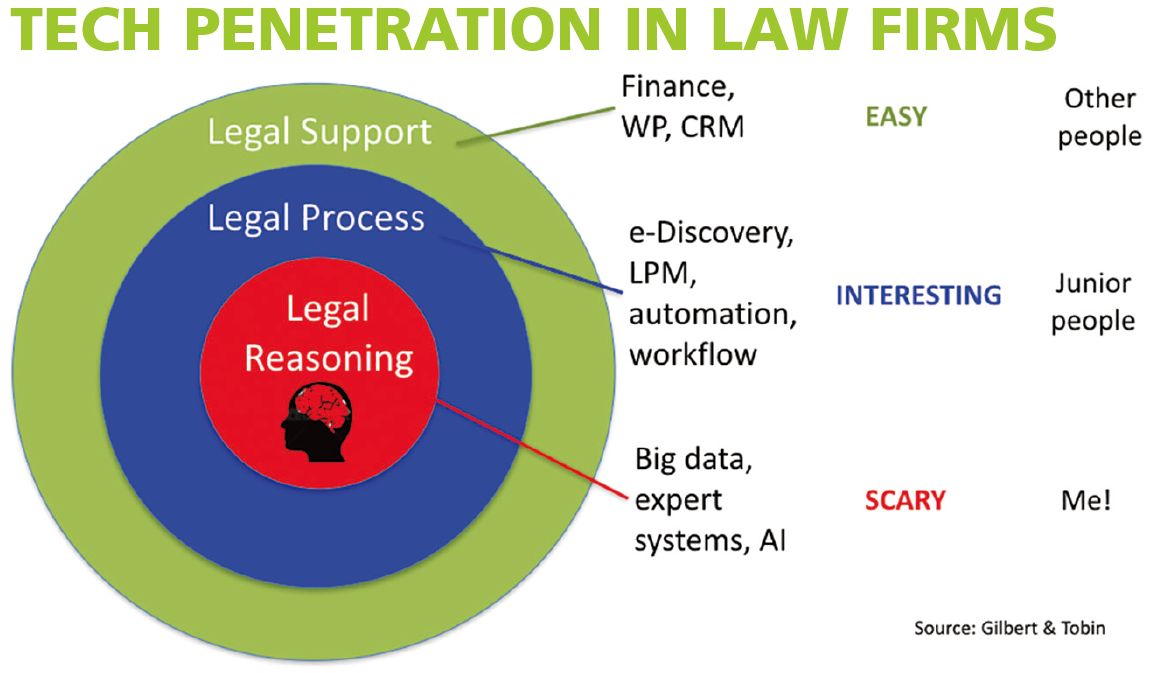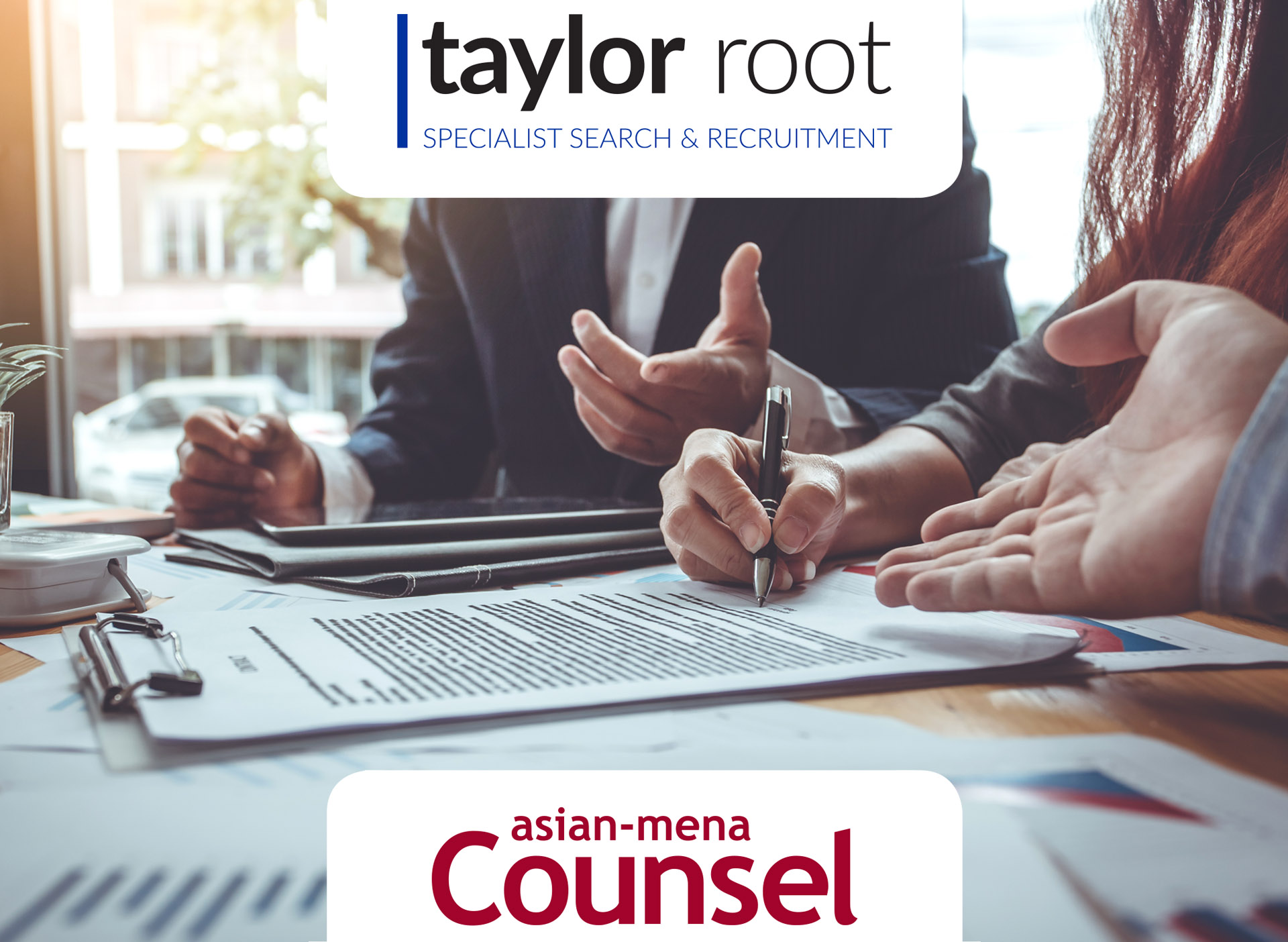
By Peter Connor, Alternatively Legal
E: peter.connor@alternativelylegal.com
In 2011, Marc Andreessen, the co-founder of Netscape, wrote the widely acclaimed essay Why Software is Eating the World. It is still frequently quoted in the press and by those working in the technology industry. The key message from that essay is that software has evolved from being no part of most businesses to becoming a way to run your business and now, increasingly, will be your business.
But surely the imperative to become a software business can’t apply to the legal profession, or can it? This article briefly explores the titular question, considers how this business trend might apply to the corporate legal industry and its implications for legal service providers, legal departments and individual lawyers.
BigLaw and software
Let’s start by looking at how BigLaw is engaging with software and explore whether firms are becoming software businesses.
On the whole, firms are increasingly using a range of software products to run their business. However, does the internal use of software and other technologies signify that firms are becoming software businesses? What does being a software business actually mean? It involves many things, but the very essence of being a software business is providing software for customers to use. So, the critical question becomes: Are firms providing software to clients in addition to legal services?
Online legal services — such as Baker McKenzie’s Law in Context, Allen& Overy’s aosphere and Pinsent Masons’ Out-Law — have been on offer for many years. Also, in recent times, a number of firms have established R&D/innovation units and some are increasingly investing in, and collaborating with, Legaltech and NewLaw businesses. Some firms are introducing Agile methodologies, like Kanban and Lean, into their working practices. These are excellent examples of firms starting to think and act more like software companies but fall short of the above definition of being a software business.
But how can firms be expected to develop software for clients when it is a difficult task even for technology companies whose core business is software? Well, I know from personal experience, as VP Products for a compliance firm, that it is achievable if you have the right resources. Leading a team of software engineers, data scientists and product managers, we developed compliance platform software, databases and a predictive analytics tool. The availability of new software development platforms makes it possible to develop some software quickly and inexpensively, often without the need to write code. If firms do not want to develop their own software then they can outsource software development to a software house or they can re-sell/re-package software produced by others.
Despite the challenges, an increasing number of firms have started to offer software to clients. Norton Rose Fullbright, for example, offers ContractorCheck, a privacy chatbot called Parker and a web-based collaboration tool called dealVault. DLA Piper offers a bid management platform called Ascendant and has partnered with Exari to provide DocGen software to clients marketed as ‘documents as a service”. Eversheds Sutherland offers its clients a range of software products to use including ES Unity which is a matter and contract management system developed by their technology partner Repstor.
Corrs Chambers Westgarth has created a client technology solutions team that has developed an app called Corrs Crisis Covered and a collaboration platform called Corrs Collaborate. According to Berys Amor, the Corrs CIO, “we’re moving from just being a provider of legal services to …. giving them [clients] a tool that they can use to improve their business process and we’ll slot legal services into that.” Minter Ellison offers its ME Taskflow matter management software to clients and, in a really significant move, it recently acquired the technology consulting company, IT Newcom, to offer technology consulting to business clients not just in-house lawyers.
It is still very early days for firms to provide software to clients and the few that do are typically either reluctant to market it or not effective at doing so. Not surprisingly, most of the software being provided is intended to facilitate the core legal services business rather than become a significant source of new revenue. While I am not aware of any Firm adopting an explicit strategy of becoming a software business, the ones that I speak to no longer scoff at the idea when I propose it to them. Once firms understand the compelling business reasons, it is likely that they will increasingly provide clients with software in addition to legal and other non-traditional services. Expect this trend to accelerate given the rewards in the software business for ‘first movers’ and the potential disadvantages for firms if clients start relying on software provided by another legal service provider.
 Legaltech, NewLaw, the Big Four and others
Legaltech, NewLaw, the Big Four and others
Providing software to clients may be relatively new for firms but for most NewLaw providers it is a fundamental part of their business model and their value proposition for clients. In some cases, software sales are intended to contribute significantly to overall revenue. In other cases, software is a hook for service revenue. Axiom, a global NewLaw pioneer, offers clients a contract management software solution called Iris as well as AxiomAI, built on the Kira platform, for contract review. Riverview Law provides clients with dashboards, triage and virtual assistants using technology developed by Kim Technologies, a company it acquired. Elevate offers its clients a range of its Cael software products. Zico Law’s Shake Up provides document automation software to clients through a distribution arrangement with Epoq Legal.
The Big Four are also starting to develop software. The focus is primarily for internal use but some are offering technology consulting services to, and developing software for, clients. In fact, I’ve been recently retained by one of them to lead the development of software products for their legal clients.
According to AngelList, there are about 1,700 Legaltech startup businesses roughly doubling in number every year. Most of these businesses sell primarily to legal service providers and not all will survive. However, this explosion in the number of Legaltech companies confirms the commercial attractiveness of supplying legal software.
Then there are ‘others’, like publisher Thomson Reuters, that, through various acquisitions, now provides firms and in-house departments with a comprehensive suite of software products in addition to managed services.
Relevance to in-house legal departments
Based on the developments outlined above, in-house legal departments can expect to be offered an ever-increasing and diverse range of software and ‘non-traditional’ services from firms and a variety of other businesses. So, what does all this mean for in-house departments?
Until now the choice of an external legal service provider has largely been based on legal expertise and the personal relationship with individual lawyers. Increasingly, that choice might also need to take into account any software and non-legal services being offered. This will be even more relevant if there is a limited technology budget and the software is being offered for free. However, beware the free lunch! Will you be able to use the software provided by one service provider if you decide to engage additional service providers? If so, will it still be free and remain a viable option? What happens if, after your legal and business colleagues have become accustomed to using the software, you want to stop obtaining legal services from the provider that supplied the software? Despite these considerations, I know of large corporate clients that have signed up to multi-year legal service agreements primarily because the use of software was ‘bundled for free’.
 Choosing legal service providers — even if it becomes more complicated — is within the comfort zone of in-house lawyers. But most lawyers are not so familiar with choosing whether to adopt software, what software to adopt and who to source it from. There are many potential traps in software procurement and deployment and the organisational impact is typically significant. To compound the challenge, the best options for legal services are almost always local but the same may not necessarily be true for software. In-house lawyers may benefit from independent guidance from those with technology expertise to conduct technology needs assessments and to develop a technology and data roadmap that allows you to pro-actively decide the right software to use from the right source at the right time.
Choosing legal service providers — even if it becomes more complicated — is within the comfort zone of in-house lawyers. But most lawyers are not so familiar with choosing whether to adopt software, what software to adopt and who to source it from. There are many potential traps in software procurement and deployment and the organisational impact is typically significant. To compound the challenge, the best options for legal services are almost always local but the same may not necessarily be true for software. In-house lawyers may benefit from independent guidance from those with technology expertise to conduct technology needs assessments and to develop a technology and data roadmap that allows you to pro-actively decide the right software to use from the right source at the right time.
What can individual lawyers do?
If software is indeed becoming the business of your firm or company then it is imperative that individual lawyers start taking steps now to take advantage of, and not be overwhelmed by, technology. Here are just a few of the things that I recommend to my clients:
- Increase your technology competence — you do not necessarily need to learn how to code but you should at least improve your ability to use your existing technology and try using the many new tools available to improve efficiency and effectiveness.
- Enhance your knowledge of technology — taking the time to learn about available software and the technology industry in general will not only help you make smarter technology purchasing decisions, it will also help you and your team to start thinking more like a software business and how you can ‘productise’ your services.
- Develop ‘non-traditional’ skills — with all the hype and media focus on technology, it is sometimes easy to forget that technology is just one means to innovate and add value. Developing and utilising a range of ‘non-traditional’ skills, as I outlined in my T-shaped lawyer article, will also help you to achieve that objective.
Conclusion
Will firms become software companies? Most will not, of course. The only certainty is that software will become a more prominent factor for you and your colleagues whether you work in-house or with a legal service provider. It will become ‘your business’. With software eating the world, consider how you can use technology and non-traditional skills to add value for your ‘customer’ and then partner with firms, consultants and other companies who can help you achieve that.
———————————
 Peter Connor will conduct a workshop in Hong Kong on May 18 – Innovation for Lawyers: Why and how to innovate, change and succeed.
Peter Connor will conduct a workshop in Hong Kong on May 18 – Innovation for Lawyers: Why and how to innovate, change and succeed.
Specially designed and adapted for the In-House Community, this one-day programme will provide a new direction and critical non-traditional knowledge and skills to help you innovate and change the way you work to add more value for your organisation.
![]()
E: peter.connor@alternativelylegal.com




















